Identity Verification SDKs: Features and Benefits
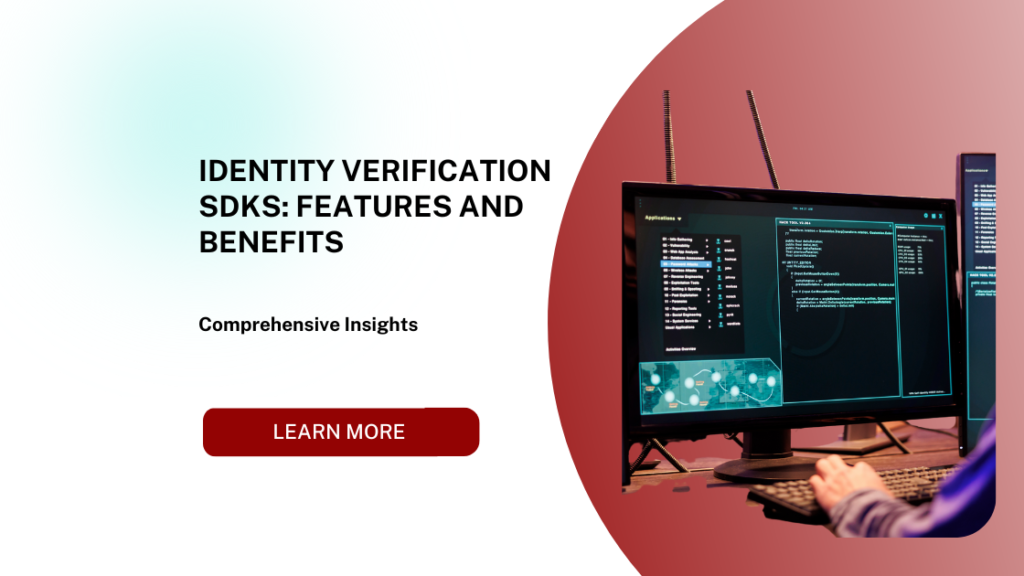
What is an Identity Verification SDK and Why Does It Matter?
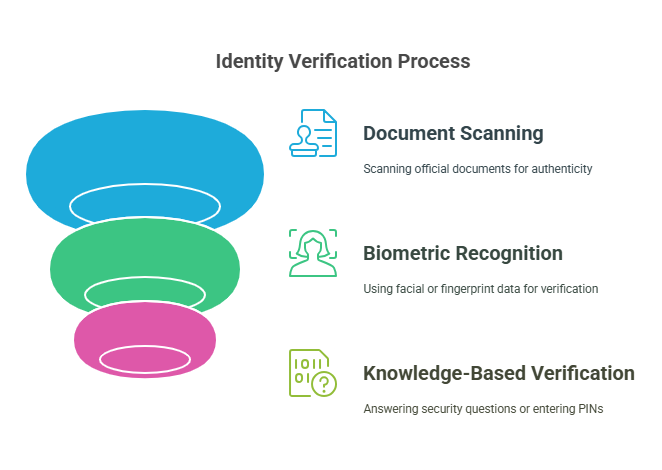
In an increasingly digital world, identity verification is an essential process for ensuring that individuals and organizations are who they say they are. From online banking and e-commerce platforms to healthcare services and government applications, verifying the identity of users has become critical to safeguarding sensitive information and preventing fraud. Whether it’s for accessing accounts, processing transactions, or receiving healthcare, accurate identity verification helps protect both businesses and consumers from identity theft, financial fraud, and unauthorized access.
Identity verification methods vary, but they typically include document scanning, biometric recognition (such as facial recognition or fingerprints), and knowledge-based verification (e.g., security questions or PINs). These technologies ensure that only authorized individuals gain access to their accounts or complete transactions.
What is an Identity Verification SDK?
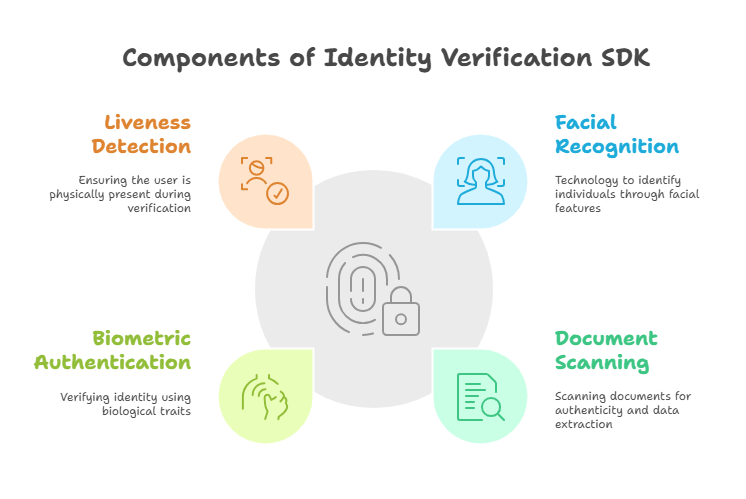
An Identity Verification SDK (Software Development Kit) is a collection of pre-built software tools and components that developers can use to integrate identity verification capabilities into their applications or platforms. SDKs provide ready-to-use solutions, saving developers from building these features from scratch. Instead of creating complex identity verification processes in-house, businesses can rely on an SDK to manage tasks such as scanning IDs, verifying personal data, and confirming the authenticity of documents or biometric data.
SDKs offer features such as:
- Facial recognition
- Document scanning (e.g., passports, driver’s licenses)
- Biometric authentication (e.g., fingerprints, voice recognition)
- Liveness detection (to ensure the user is physically present)
This makes SDKs highly effective in reducing development time, improving security, and ensuring compliance with data protection regulations.
How Identity Verification SDKs Work
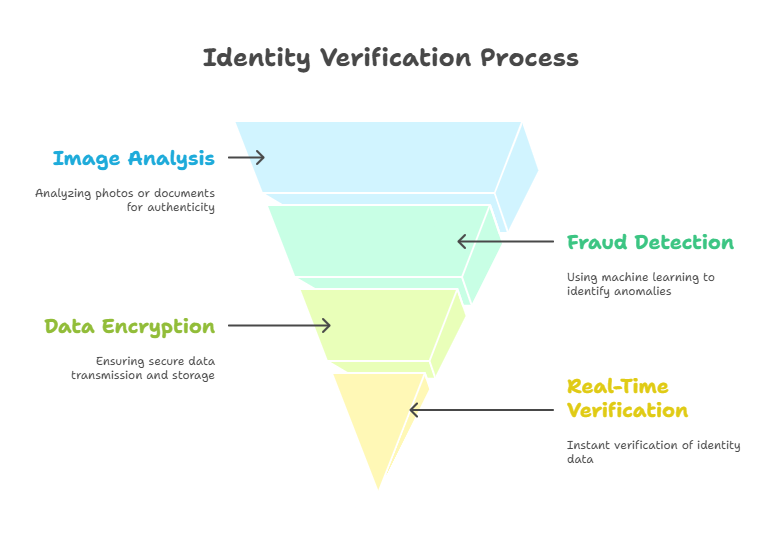
An Identity Verification SDK functions by incorporating a variety of algorithms and technologies into an application. These technologies often include image recognition, optical character recognition (OCR), machine learning models, and encryption protocols to accurately verify an individual’s identity.
Key Technical Aspects:
- Image Recognition: The SDK analyzes photos or scanned documents, comparing them with databases of authentic ID images to ensure validity.
- Machine Learning: SDKs often use machine learning algorithms to detect fraud patterns or anomalies in facial features, documents, or behavioral biometric data.
- Encryption: Secure data transmission is vital, and SDKs ensure personal and sensitive information is encrypted both during storage and while being transferred over networks.
- Real-Time Verification: SDKs can instantly verify biometric data or scanned documents, allowing businesses to confirm identity within seconds.
These processes ensure the accuracy and security of identity verification, preventing errors and fraud.
Types of Identity Verification SDKs
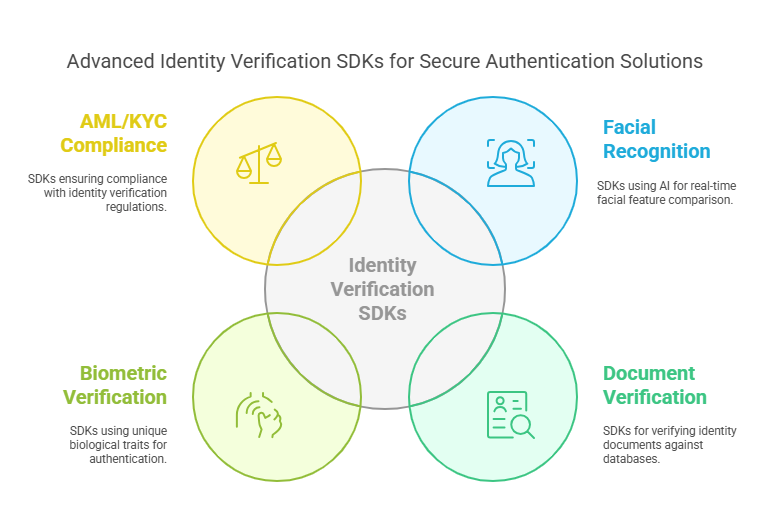
Different types of Identity Verification SDKs are tailored to various use cases and industries. Some common types include:
- Facial Recognition SDKs: These SDKs use AI to compare facial features in real-time against a database or scanned images, often used for online login systems or financial transactions.
- Document Verification SDKs: These SDKs are used to verify documents such as passports, ID cards, or driver’s licenses by extracting and cross-checking their data (e.g., name, DOB) with government databases.
- Biometric Verification SDKs: These SDKs authenticate individuals using unique biological traits like fingerprints, voiceprints, or iris scans, commonly used for highly secure environments.
- AML/KYC SDKs: These SDKs help businesses comply with Anti-Money Laundering (AML) and Know Your Customer (KYC) regulations by verifying customer identities and detecting fraudulent activity.
Each type of SDK serves a different need, depending on the level of security required and the specific application.
Key Applications and Benefits of Using Identity Verification SDKs
Applications of Identity Verification SDKs
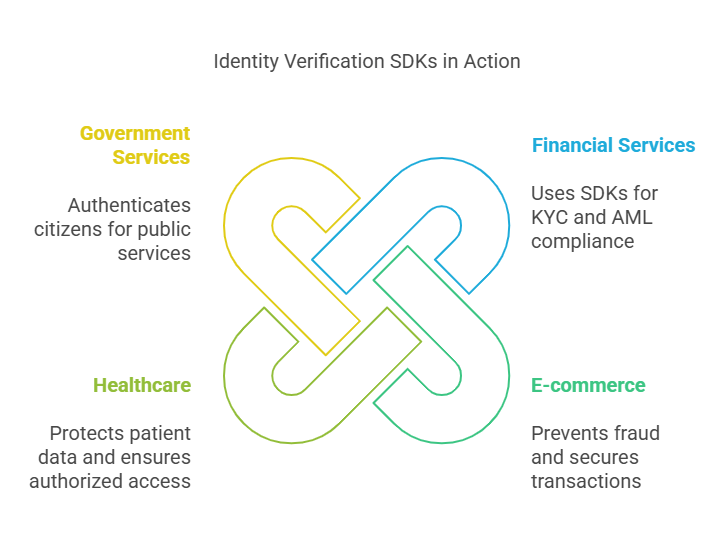
The integration of Identity Verification SDKs spans a wide range of industries, each benefiting from enhanced security, compliance, and user experience. Below are some of the key areas where these SDKs are heavily utilized:
1. Financial Services
In the financial sector, identity verification SDKs are critical for verifying the identity of users during account creation, online banking, lending applications, and cryptocurrency transactions. These SDKs help financial institutions comply with KYC (Know Your Customer) and AML (Anti-Money Laundering) regulations by ensuring customers are legitimate and not involved in illegal activities. For instance:
- Online banking apps use facial recognition and document scanning SDKs to verify the identity of customers opening accounts or transferring funds.
- Lending platforms verify the borrower’s identity to avoid fraud.
2. E-commerce and Online Marketplaces
E-commerce platforms, online marketplaces, and mobile apps rely on identity verification SDKs to prevent fraudulent transactions, secure user accounts, and ensure a seamless login process. SDKs make it easier for businesses to implement:
- Secure sign-ups and logins with biometric authentication or two-factor authentication.
- Verification of sellers to ensure that only legitimate businesses can offer goods or services.
3. Healthcare
In the healthcare industry, identity verification is essential for safeguarding patient data and ensuring that individuals accessing medical records are the authorized parties. Healthcare providers use SDKs to:
- Verify patient identities during online appointments.
- Grant access to medical records while ensuring HIPAA compliance.
- Prevent identity theft by securing personal health information (PHI).
4. Government Services
Governments use identity verification SDKs to authenticate citizens applying for services such as social security, voting, and public assistance programs. By verifying identities electronically, governments can:
- Ensure secure access to public services like welfare or unemployment benefits.
- Prevent fraudulent voting during elections.
- Comply with security regulations for citizen data.
Benefits of Using Identity Verification SDKs
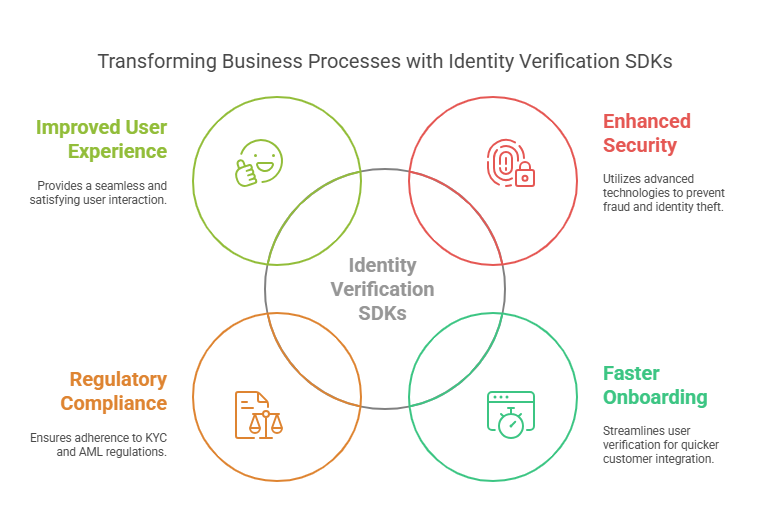
Integrating Identity Verification SDKs into business processes brings several significant benefits:
1. Enhanced Security
Identity verification SDKs use advanced technologies like machine learning and AI to detect fraud, ensuring only legitimate users can access sensitive information. By integrating features like liveness detection and biometric verification, these SDKs significantly reduce the risk of identity theft and fraud.
2. Faster Onboarding
SDKs streamline the verification process, reducing the time it takes to onboard new customers or users. With the help of automated identity checks and instant verification, businesses can approve or reject users quickly, leading to a smoother and faster customer experience.
3. Regulatory Compliance
SDKs are designed to help businesses comply with industry regulations, such as KYC and AML laws. This ensures that businesses meet legal requirements while verifying their customers’ identities and preventing fraud. SDKs automate the documentation and reporting process, making compliance much simpler.
4. Improved User Experience
A seamless verification process improves the overall user experience, leading to higher customer satisfaction. With automated identity checks, users can quickly access their accounts or services without lengthy paperwork or waiting times.
ExactBackgroundChecks Services
ExactBackgroundChecks is an example of a service provider that integrates identity verification SDKs into its background check services. By using advanced SDK technology, ExactBackgroundChecks ensures that users’ personal information is accurately verified, preventing errors and security risks while maintaining compliance with relevant regulations.
Legal Aspects of Using Identity Verification SDKs
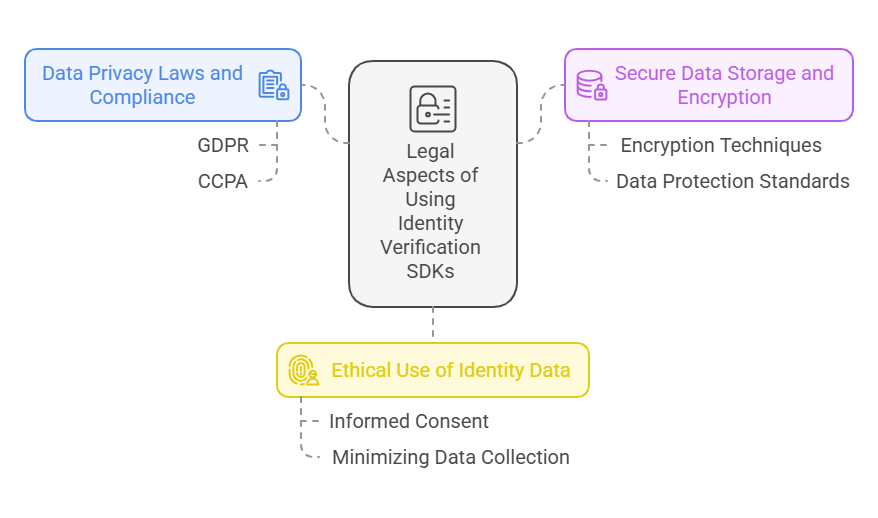
1. Data Privacy Laws and Compliance
When implementing identity verification SDKs, businesses must ensure they comply with data privacy regulations, such as GDPR (General Data Protection Regulation) in Europe and the CCPA (California Consumer Privacy Act) in the United States. These laws require businesses to handle personal data securely, obtain user consent, and provide transparency about how data is used.
2. Secure Data Storage and Encryption
Businesses must store and transmit sensitive personal data securely. SDKs use advanced encryption techniques to protect information both at rest and during transmission. Compliance with data protection standards like GDPR ensures that customers’ identities are safely stored.
3. Ethical Use of Identity Data
Identity verification SDKs should be used responsibly and ethically. This means obtaining informed consent from users and using their data only for the intended purpose. Ethical considerations also include minimizing the collection of personal data and ensuring that no sensitive information is misused.
Frequently Asked Questions (FAQs) About Identity Verification SDKs
What is an identity verification SDK?
An identity verification SDK is a software toolkit that integrates identity verification features into applications or systems. It ensures user authenticity using methods like biometrics, document authentication, and liveness detection.
How does an identity verification SDK work?
The SDK collects user-provided data, such as a photo of an ID document or a biometric scan, and processes it using advanced algorithms to verify the user\u2019s identity. The results are then returned to the application for further actions.
Which industries benefit from identity verification SDKs?
Industries such as banking, e-commerce, healthcare, online gaming, and gig economy platforms significantly benefit from these tools by enhancing security, ensuring compliance, and preventing fraud.
Are identity verification SDKs secure?
Yes, reputable SDKs use encryption, secure APIs, and advanced fraud detection methods to protect user data and ensure secure processing.
How do identity verification SDKs ensure compliance with regulations?
SDKs are designed to comply with data protection laws (e.g., GDPR, CCPA) and industry-specific standards (e.g., KYC, AML). Features like consent management, audit logs, and secure storage help businesses maintain compliance.
What is an identity verification SDK?
An identity verification SDK is a software toolkit that integrates identity verification features into applications or systems. It ensures user authenticity using methods like biometrics, document authentication, and liveness detection.
How does an identity verification SDK work?
The SDK collects user-provided data, such as a photo of an ID document or a biometric scan, and processes it using advanced algorithms to verify the user\u2019s identity. The results are then returned to the application for further actions.
Which industries benefit from identity verification SDKs?
Industries such as banking, e-commerce, healthcare, online gaming, and gig economy platforms significantly benefit from these tools by enhancing security, ensuring compliance, and preventing fraud.
Are identity verification SDKs secure?
Yes, reputable SDKs use encryption, secure APIs, and advanced fraud detection methods to protect user data and ensure secure processing.
How do identity verification SDKs ensure compliance with regulations?
SDKs are designed to comply with data protection laws (e.g., GDPR, CCPA) and industry-specific standards (e.g., KYC, AML). Features like consent management, audit logs, and secure storage help businesses maintain compliance.
Conclusion
Identity Verification SDKs are powerful tools that enable businesses to securely verify the identity of their users, ensuring compliance with regulations and protecting sensitive information. By leveraging SDKs, businesses can enhance security, streamline user onboarding, and improve customer satisfaction. As identity verification technologies continue to evolve, integrating SDKs will remain a key strategy for businesses across industries, from financial services to e-commerce and healthcare.
For businesses seeking reliable and secure identity verification solutions, services like ExactBackgroundChecks offer comprehensive SDK integration, ensuring both accuracy and compliance with industry standards.



